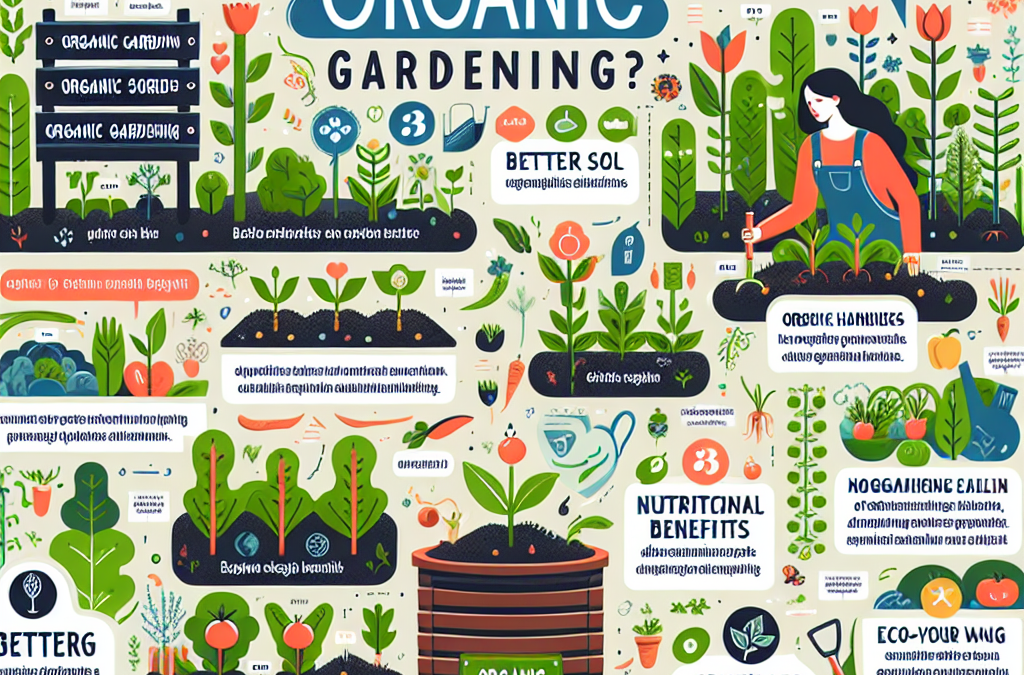Organic gardening is a method of growing plants and vegetables without the use of synthetic fertilizers, pesticides or genetically modified organisms (GMOs). It involves using natural methods to nourish and protect plants from pests and diseases. In recent years, there has been an increasing interest in organic gardening due to concerns about the safety of chemical-based agriculture. If you are considering starting your own organic garden, here are some benefits that may convince you to take the plunge.
Introduction to Organic Gardening
Organic gardening is based on the principles of sustainability and environmental responsibility. Instead of relying on synthetic chemicals, organic gardeners use natural materials such as compost, mulch, and animal manures to feed their plants. They also practice crop rotation, companion planting, and other techniques to promote healthy soil and prevent pest infestations. By avoiding GMOs, organic gardeners can help preserve biodiversity and support local ecosystems.
The Benefits of Going Organic
There are many reasons why people choose to go organic. Here are just a few benefits:
1. Better Taste – Many people believe that organic produce tastes better than conventionally grown fruits and vegetables because it is fresher and more flavorful. This is because organic farmers typically harvest their crops at peak ripeness rather than picking them early for shipping purposes.
2. More Nutritious – Studies have shown that organic food contains higher levels of vitamins, minerals, and antioxidants compared to conventional produce. This is because organic farming practices encourage the growth of healthier soils which in turn leads to healthier plants with greater nutrient content.
3. Reduced Exposure to Pesticides – One of the main advantages of going organic is reduced exposure to pesticides. While conventional farmers rely heavily on synthetic pesticides to control insects and weeds, organic growers use natural methods like handpicking, trapping, and biological controls. This means less exposure to harmful chemicals not only for consumers but also for farmworkers who handle these products daily.
4. Support Local Farmers – Buying locally produced organic food supports small family farms and helps reduce carbon emissions associated with transportation. By buying directly from farmers, you can be assured of the quality and freshness of your food while helping to build stronger communities.
How to Start Your Own Organic Garden
Starting your own organic garden doesn’t require a lot of space or money. Here are some tips to get started:
1. Choose the Right Location – Select an area that receives plenty of sunlight and has well-draining soil. Avoid areas near busy roads or industrial sites where pollution could affect your plants.
2. Build Healthy Soil – The key to successful organic gardening is building healthy soil. Add lots of organic matter like compost, leaves, and grass clippings to enrich the soil and improve drainage.
3. Choose the Right Plants – Select plants that are well suited to your climate and growing conditions. Look for heirloom varieties or open-pollinated seeds that are adapted to your region.
4. Practice Good Garden Hygiene – Keep your garden clean by removing dead plant material and weeding regularly. Use natural remedies like neem oil or garlic spray to control pests and diseases.
Common Mistakes to Avoid When Starting an Organic Garden
Here are some common mistakes to avoid when starting an organic garden:
1. Overwatering – Too much water can lead to root rot and fungal disease. Make sure to water deeply but infrequently to encourage deep root growth.
2. Not enough sunlight – Most vegetable plants need at least 6 hours of direct sunlight per day to thrive. Make sure to select a location that provides adequate light.
3. Using poor quality soil – Poor soil can lead to stunted growth and increased susceptibility to pests and diseases. Take time to amend your soil with organic matter before planting.
Conclusion and Final Thoughts
Going organic isn’t just a trend; it’s a lifestyle choice that offers numerous benefits to both human health and the environment. Whether you start a small herb garden or a large vegetable patch, organic gardening can provide you with fresh, delicious produce while promoting sustainability and responsible land stewardship.





